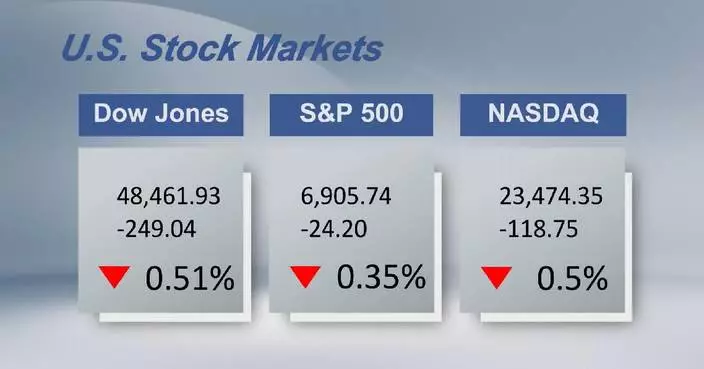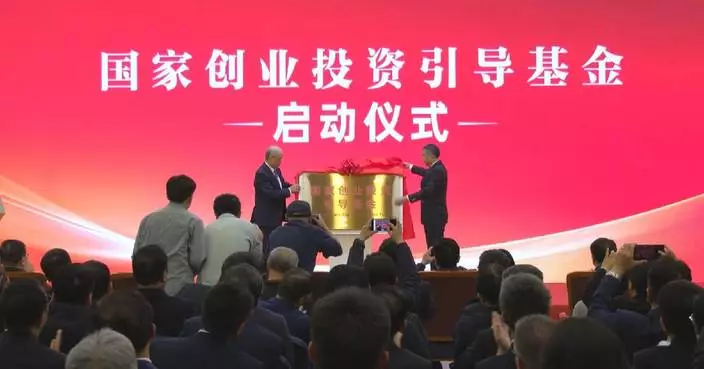Feature · News
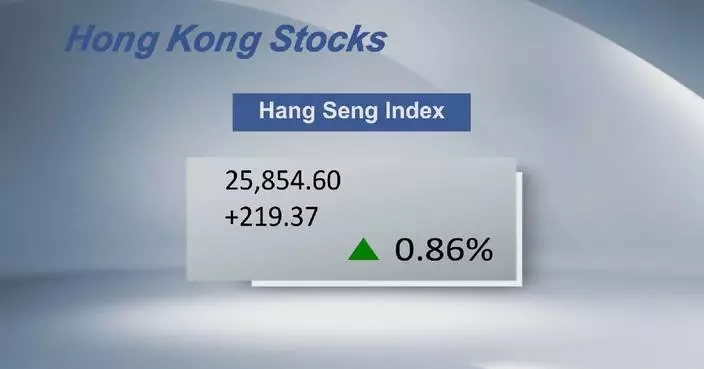
Hong Kong stocks close 0.86 pct higher

China's total value of logistics up 5 pct to 47.27 trln US dollars in first 11 months

Escalation in Yemen threatens to reignite civil war and create wider tensions in Gulf region

6.6-magnitude quake hits waters off Taiwan: CENC

Landslide-affected residents in Sichuan to move into new homes by Spring Festival

China's sports consumption posts sustained growth in 2025: report

Beijing housing market picks up after adjustment of purchasing policy

China to apply lower tariff rates to certain imports in 2026
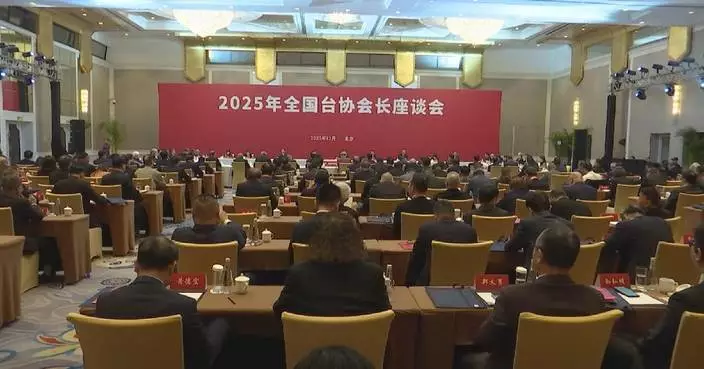
Taiwan businesses confident over greater opportunities in mainland

PLA Eastern Theater Command conducts joint drills around Taiwan

In escalating tensions with Venezuela, Trump says the US 'hit' a coastal drug loading facility

PLA forces demonstrate joint strike capabilities during 2nd day of live-fire drills around Taiwan

US faith leaders supporting targeted immigrants brace for a tough year ahead

Government Extends Unused Electricity Subsidy Validity to December 31, 2026

Suspected of False Reporting of Participation in the Free Special Ride Service of the Tai Po Fire, Five Taxi Drivers Have Been Arrested

HKMA Warns Public About Fraudulent Banking Scams and Websites
Beijing housing market picks up after adjustment of purchasing policy
China to apply lower tariff rates to certain imports in 2026
Taiwan businesses confident over greater opportunities in mainland
PLA Eastern Theater Command conducts joint drills around Taiwan
Hong Kong stocks close 0.86 pct higher
China's total value of logistics up 5 pct to 47.27 trln US dollars in first 11 months

Escalation in Yemen threatens to reignite civil war and create wider tensions in Gulf region
6.6-magnitude quake hits waters off Taiwan: CENC
Landslide-affected residents in Sichuan to move into new homes by Spring Festival
China's sports consumption posts sustained growth in 2025: report

In escalating tensions with Venezuela, Trump says the US 'hit' a coastal drug loading facility
PLA forces demonstrate joint strike capabilities during 2nd day of live-fire drills around Taiwan

US faith leaders supporting targeted immigrants brace for a tough year ahead

Government Extends Unused Electricity Subsidy Validity to December 31, 2026

Suspected of False Reporting of Participation in the Free Special Ride Service of the Tai Po Fire, Five Taxi Drivers Have Been Arrested

HKMA Warns Public About Fraudulent Banking Scams and Websites
Feature·Bloggers

【What Say You?】Black Riots “comrades” Thought Ukraine Was Another “Resistance”—Then the Contract Hit

【Bastille Commentary】Green Nails? The Lie No Lawyer Would Touch

【What Say You?】How Jimmy Lai's Right-Hand Man Ran a Corporate Shakedown Operation

【Deep Blue】Trump's "Empire Strikes Back" Gambit: A Long Shot at Best

【What Say You?】Unfinished business With the “anti-Hong Kong triangle”?

【Bastille Commentary】UK's Hypocrisy on Display: Seizing Private Assets While Preaching Freedom

Kennedy Center renaming prompts a new round of cancellations
- German prosecutors will drop probe of Russian magnate Usmanov after he agrees to pay nearly $12M
- New Orleans is still seeking permanent security solutions a year after deadly Bourbon Street attack
- Flu is rising rapidly, driven by a new variant. Here's what to know
- A Colombian city swaps iconic horse buggies for electric carriages amid animal welfare concerns
- Patriots star receiver Stefon Diggs faces strangulation charge, denies allegations
- Extreme Midwest cold follows storm that barreled across Great Lakes and Northeast
- Biobeat Secures $50 Million Series B Financing to Advance Commercialization of its Patch-worn, Cuff-less 24-hour Ambulatory Blood Pressure Monitor
- Kara Wolke Recognized in the 2025 Lawdragon 500 Leading Plaintiff Financial Lawyers Guide
- Stocks edge lower as 2025 winds down while gold and silver rise
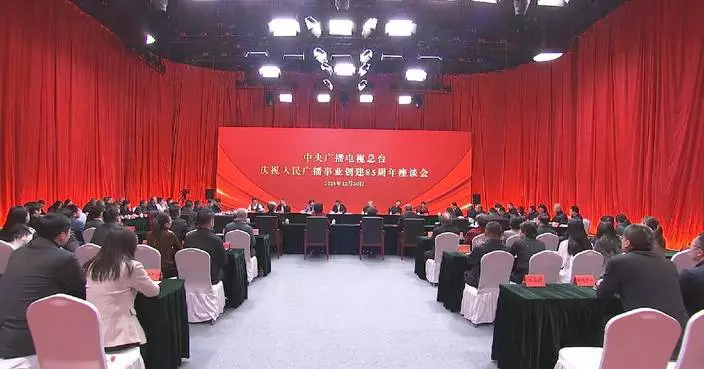
CMG holds symposium to mark 85th anniversary of founding of people's radio broadcasting
- PLA's amphibious assault ship Hainan takes part in drills around Taiwan
- Chinese FM addresses Symposium on International Situation and China's Foreign Relations
- Fujian coast guard conducts law enforcement, control drills near Taiwan Island
- Top political advisor meets with Chinese Taoist delegates
- Fujian coast guard conducts law enforcement, control drills near Taiwan Island
- Central African Republic holds general elections
- Justice Mission 2025 aims at defending justice: expert
- PLA practices seizure of key ports during drills in waters to east of Taiwan
- Military expert shares key highlights of PLA live-fire drills

PARIS BAGUETTE PARTNERS WITH MAJOR LEAGUE SOCCER CLUB LAFC
- Judge blocks White House's attempt to defund the CFPB, ensuring employees get paid
- Channel Tunnel disruption affects Eurostar and vehicle shuttle between France and England
- Meta buys startup Manus in latest move to advance its artificial intelligence efforts
- The legendary Warren Buffett steps back this week and Berkshire Hathaway enters a new era
- TCL Unveils Note A1 NXTPAPER: AI-Powered E-Note with Paper-Like Display and Smart Productivity Tools
- HTX Futures Head Breaks It Down: What HTX Futures Got Right in 2025 and Where It's Headed Next
- Italy's Parliament approves 2026 budget with deficit-cutting measures
- THIRDREALITY Showcases 2026 Product Roadmap and New Smart Devices at CES 2026
- World Customs Organization praises 'e-commerce platform' in trilingual report

US commits $480m in health funding to Ivory Coast, the latest to sign 'America First' health deals
- Israel says it will halt operations of several humanitarian organizations in Gaza starting in 2026
- SNAP bans on soda, candy and other foods take effect in five states Jan. 1
- 'Trump’s EPA' in 2025: A fossil fuel-friendly approach to deregulation
- The year's first meteor shower and supermoon clash in January skies
- New 2026 laws are among the first of their kind to tackle climate change, drunken driving
- What's inside Mexico's Popocatépetl volcano? Scientists obtain first 3D images
- 2025 was one of three hottest years on record, scientists say
- Trying to improve your health and wellness in 2026? Keep it simple
- The moon and sun figure big in the new year's lineup of cosmic wonders

Indiana football's rise to national title contender rewards fans who endured decades of losing
- LOCALIZE IT: Marching bands, equestrian units from several states featured in Rose Parade on Jan. 1
- Roses in the rain? New Year's Day parade in Pasadena gets wet forecast. Bundle up for NYC ball drop
- France grants citizenship to George and Amal Clooney and their twins Ella and Alexander
- Brigitte Bardot's funeral will be held next week in French Riviera resort of Saint-Tropez
- Hollywood stars Idris Elba, Cynthia Erivo recognized in New Year's honor's list
- Tyler Perry's accuser sent messages of gratitude and friendship years after alleged assault
- Rain could be an unwelcome entry at the Rose Parade on New Year's Day. Bundle up for NYC ball drop
- Movie Review: 'The Plague' dives into a sink-or-swim water polo camp
- Movie Review: Daisy Ridley holds onto hope in the zombie thriller ‘We Bury the Dead’

The Africa Cup of Nations already knows which teams have made it to the knockout stage
- Premier League leader Arsenal routs Aston Villa 4-1 to move 5 points ahead of City
- Senegal and Congo get big wins at Africa Cup while Tanzania and Tunisia squeeze into knockout stage
- Six-time IndyCar champion Scott Dixon receives a knighthood from New Zealand
- Buccaneers are focused on playing the Panthers, knowing they'll need help to win the NFC South
- Senegal captain Kalidou Koulibaly sent off in 100th appearance, will miss last 16 game at Africa Cup
- Cowboys waive cornerback Trevon Diggs to end tumultuous finish to his Dallas career
- Orange Bowl showdown: Texas Tech and Oregon are mirror images, set to face off in CFP quarterfinals
- Steelers could have T.J. Watt back for 'AFC North championship' showdown against Ravens
- Bijan Robinson, Falcons finishing strong with 3rd straight win after elimination from playoffs

Police Investigate Murder of Local Woman Found Dead in Sau Mau Ping
- Special Traffic and Transport Arrangements Announced for New Year's Eve Celebrations in Central
- Hong Kong Customs Signs First Mutual Recognition Arrangement with Peru to Boost Trade Ties.
- Food Poisoning Investigation: Eight Affected After Consuming Takeaway Poon Choi and Scallop Fried Rice.
- Sure! Please provide the article or its main points so I can create a headline for you
- Two New Sections of GreenWay in the Kai Tak Development Area Open Today
- Swire Properties’ “BOOKS FOR LOVE @ $10” Collection Drive Launches on 1 January 2026 Promoting mental wellness and family harmony through the joy of reading
- FSTB Updates on Procurement Review and Disciplinary Investigation for Bottled Water Procurement Incident
- The Peak Tram Fare has Increased since the End of 2025
- Mr Paul Chan Expects Hong Kong's Economy to Maintain a Good Momentum in 2026

CMG stages New Year Gala to welcome 2026
- Activities held to retrace steps of Long March
- Chinese shares close higher Tuesday
- Beijing Tongzhou Railway Station put into operation
- Defiant Venezuelans prepare to greet New Year amid mounting US pressure
- China to continue playing constructive role for rebuilding trust between Cambodia, Thailand through Asian way: FM
- China Media Group releases top 10 rural revitalization news of 2025
- Infrared camera captures giant panda mom mediating in kids' fighting
- Expert highlights long-range multiple rocket launchers' role in deterring separatists
- Takaichi should either retract erroneous remarks or resign: Japanese scholar
Category · News

The Africa Cup of Nations already knows which teams have made it to the knockout stage

Premier League leader Arsenal routs Aston Villa 4-1 to move 5 points ahead of City

Kennedy Center renaming prompts a new round of cancellations

German prosecutors will drop probe of Russian magnate Usmanov after he agrees to pay nearly $12M

New Orleans is still seeking permanent security solutions a year after deadly Bourbon Street attack

Senegal and Congo get big wins at Africa Cup while Tanzania and Tunisia squeeze into knockout stage

Indiana football's rise to national title contender rewards fans who endured decades of losing

Flu is rising rapidly, driven by a new variant. Here's what to know

Six-time IndyCar champion Scott Dixon receives a knighthood from New Zealand

Buccaneers are focused on playing the Panthers, knowing they'll need help to win the NFC South

A Colombian city swaps iconic horse buggies for electric carriages amid animal welfare concerns

Senegal captain Kalidou Koulibaly sent off in 100th appearance, will miss last 16 game at Africa Cup

Cowboys waive cornerback Trevon Diggs to end tumultuous finish to his Dallas career

Patriots star receiver Stefon Diggs faces strangulation charge, denies allegations

Extreme Midwest cold follows storm that barreled across Great Lakes and Northeast

Biobeat Secures $50 Million Series B Financing to Advance Commercialization of its Patch-worn, Cuff-less 24-hour Ambulatory Blood Pressure Monitor

Kara Wolke Recognized in the 2025 Lawdragon 500 Leading Plaintiff Financial Lawyers Guide

Stocks edge lower as 2025 winds down while gold and silver rise

DOJ pushed to prosecute Kilmar Abrego Garcia only after mistaken deportation, judge's order says

The top photos of the day by AP's photojournalists

Thieves drill into a German bank vault and steal tens of millions of euros worth of property

PARIS BAGUETTE PARTNERS WITH MAJOR LEAGUE SOCCER CLUB LAFC

Rescue crew finds 3 hikers dead in Southern California mountains during strong winds

US commits $480m in health funding to Ivory Coast, the latest to sign 'America First' health deals
CMG holds symposium to mark 85th anniversary of founding of people's radio broadcasting

LOCALIZE IT: Marching bands, equestrian units from several states featured in Rose Parade on Jan. 1

Orange Bowl showdown: Texas Tech and Oregon are mirror images, set to face off in CFP quarterfinals

Buddhist monks persist in peace walk despite injuries as thousands follow them on social media

Steelers could have T.J. Watt back for 'AFC North championship' showdown against Ravens

Israel says it will halt operations of several humanitarian organizations in Gaza starting in 2026

Bijan Robinson, Falcons finishing strong with 3rd straight win after elimination from playoffs
PLA's amphibious assault ship Hainan takes part in drills around Taiwan

Roses in the rain? New Year's Day parade in Pasadena gets wet forecast. Bundle up for NYC ball drop

41 young men die in South Africa from circumcision procedures during initiation ceremonies

Scalley steps in as Utah's coach for the Las Vegas Bowl after Whittingham's departure

Judge blocks White House's attempt to defund the CFPB, ensuring employees get paid

Arctic blast brings snow and wind to the Great Lakes and Northeast
Chinese FM addresses Symposium on International Situation and China's Foreign Relations

Police Investigate Murder of Local Woman Found Dead in Sau Mau Ping

SNAP bans on soda, candy and other foods take effect in five states Jan. 1

U.S. sanctions 10 people and firms from Iran and Venezuela over drone and missile trade

Channel Tunnel disruption affects Eurostar and vehicle shuttle between France and England

Liverpool parts ways with set-piece coach Aaron Briggs after team's erratic season

Protests draw largest turnout of Somalis since Israel's recognition of Somaliland

Nuggets star Nikola Jokic hyperextended his left knee and will be evaluated in 4 weeks

'Trump’s EPA' in 2025: A fossil fuel-friendly approach to deregulation

Iran's president says answer to attack would be harsh in apparent response to Trump warning

Meta buys startup Manus in latest move to advance its artificial intelligence efforts
Fujian coast guard conducts law enforcement, control drills near Taiwan Island

The legendary Warren Buffett steps back this week and Berkshire Hathaway enters a new era

Golf is a family affair for Steve Stricker's family and that includes wife Nicki

TCL Unveils Note A1 NXTPAPER: AI-Powered E-Note with Paper-Like Display and Smart Productivity Tools

Duke's unlikely ACC title season set to end against Arizona State in Sun Bowl

Magdalena 1163 Brings a New Boutique Hospitality Experience to Condado

After quiet off-year elections, Democrats renew worries about Trump interfering in the midterms

HTX Futures Head Breaks It Down: What HTX Futures Got Right in 2025 and Where It's Headed Next

Tales from the tour: Scheffler shows no mercy, even in a friendly match with his caddie

Ohio State's Caleb Downs is quite the CFP veteran heading into the quarterfinals against Miami

Italy's Parliament approves 2026 budget with deficit-cutting measures

European and Canadian leaders discuss US-led peace efforts in Russia-Ukraine war

Drew Brees, Larry Fitzgerald lead Pro Football Hall of Fame modern era finalists

Batter Jamie Smith left out of England T20 World Cup squad but injured pacer Jofra Archer included

CookUnity and New York Golf Club Announce Partnership to Elevate the Meals of the Next Generation of Golfers

THIRDREALITY Showcases 2026 Product Roadmap and New Smart Devices at CES 2026

Saudi Arabia bombs Yemen port city over weapons shipment from UAE for separatists

LIV Golf still waiting on approval from world ranking. OWGR reduces point for 54-hole events

Knee injury for Shaheen Shah Afridi forces early exit from Big Bash League

World Customs Organization praises 'e-commerce platform' in trilingual report

UAE’s Medcare Treats First International SMA Patient With Revolutionary Intrathecal Gene Therapy

Epicka to Debut World's First 140W Touchscreen Smart Universal Travel Adapter at CES 2026

Concerns over roads in Nigeria after crash that injured Anthony Joshua and killed 2 associates

South Korea will end breeding of bears and extraction of their bile

Adore Me Unveils Its 2026 Valentine’s Day Collection Featuring Bobbi Althoff

7 Brew Celebrates a Milestone 2025: 600+ Locations and Strengthened Leadership

Takeaways from AP report on what sources say was Olympic watchdog's failure to close abuse case

Where are the wackiest New Year's Eve drops in the US?

ADS-TEC Energy Ends the Year With New Battery Energy Storage Wins in Germany and Austria

Kastar Brings Standard-Driven High-tack MS Polymer Sealants to Global Green Construction Markets

The year's first meteor shower and supermoon clash in January skies
Top political advisor meets with Chinese Taoist delegates

Nota AI to Supply AI Optimization Technology for Samsung Electronics' Next-Generation Mobile AP 'Exynos 2600'… Solidifying Its Position as a Leader in On-Device AI

Tragedy follows triumph for Anthony Joshua with boxing future uncertain

Myanmar's military-backed party claims strong lead in election's first phase
Fujian coast guard conducts law enforcement, control drills near Taiwan Island









